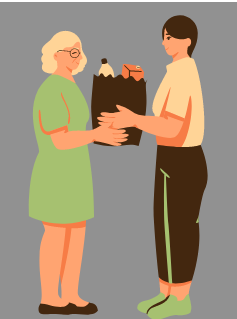Professor and Associate Director for the Translational Health Research Center Larry Fulton and his team are developing a free food delivery app, Nutrition for Underserved Elderly via Application (NUEVA), aimed at helping the older population of adults in Central Texas.
Fulton and his team are using a $2.76 million grant from The Department of Health and Human Service (HHS) to fund the development of NUEVA. The goal of the app is reducing food insecurity and loneliness as well as improving nutrition and the quality of life for individuals of 60 years old, and older. The grant can be renewed for up to five years.
“I think that it is important for the community, and so I think we can do some really good work here,” Fulton said. “Once we heard we were going to get funding, we started working immediately before the funding arrived.”
A nutrition grant through HHS and the Administration on Community Living is responsible for implementing the Older Americans Act which addresses malnutrition. Within the app, there will be an assessment of nutrition, according to Lesli Biediger-Friedman, associate professor and the lead of nutrition and outreach for NUEVA.
“We’re working on initiating a systematic review of where literature is of use of technology for public health topics among the elderly,” Biediger-Friedman said.
The development of the app started in August, but the idea for NUEVA came long before.
“COVID changed the way our elderly is able to interface,” Fulton said. “The logical step is [to] support community action here in San Marcos, and focus on using technology to provide a mechanism to provide them food, to provide them contact, assesses how they’re doing for mental health, overall health, nutrition and food security.”
Part of the initial development of NUEVA is creating the app itself, which is being coded by associate professor in the Department of Computer Science, Apan Qasem.
“Because of Dr. Apan Qasam we have both the Android the iOS and the internet apps, roughly 10% developed connecting to the back end,” Fulton said. “So, we have mockups of this that are actually already working.”
This app is supposed to help those in need, and there will be a screening process to determine the services each individual will be eligible for.
“There’s a screening process for individuals to receive meals,” Fulton said. “We’re also not just doing meals, that’s our focus, we’re also in grocery delivery.”
The deliveries will be carried out by preexisting organizations in central Texas, according to Oren Renick, a professor in the School of Health Administration.
“We’re going to need to do is to create relationships with existing transportation services for elders that exist, you might say from Georgetown to San Antonio,” Renick said. “So, there’s a whole corridor of potential colleagues and collaborators in getting food delivered.”
Alpha testing of NUEVA with a small population will begin in the spring of 2023 and allow for feedback opportunities.
“We’re going to work slowly in perfecting it and working the kinks out,” Renick said. “So, from our standpoint it’s adapting what’s known to the unknown, tying together the app with the operations.”
NUEVA’s goal is to improve the health of older adults in relation to their nutrition.
“We’re able to have really informed conversations of how to make sure we are reaching more people. Then in addition to not just reaching people, assessing for malnutrition and providing intervention,” Biediger-Friedman said. “One of the things that’s really going to help with is collecting data that allows for a nutrition intervention to be possible.”
The app and data collection can allow for the potential delivery of medically tailored meals in the future.
“Right now, medically tailored meals are not something that is wildly possible to logistically deliver, we’re potentially seeing how we can tailor meals appropriately,” Biediger-Friedman said. “The app just allows us to have those conversations with the people who are already doing it. So, we’re not coming in and replacing them. We’re coming in and helping them optimize such. I think that’s really important.”
NUEVA has the potential of being used beyond central Texas, according to Biediger-Friedman, and the potential to change lives.
“As we learn more about populations that are additionally disenfranchised, it provides additional opportunities for this particular program, to make a huge impact on our communities and help the elderly live healthy, independent lives as long as possible,” Biediger-Friedman said.
Professor creates food delivery app to aid older adult population
November 10, 2022

Untitled design – 1
Donate to The University Star
Your donation will support the student journalists of Texas State University. Your contribution will allow us to purchase equipment and cover our annual website hosting costs.


















